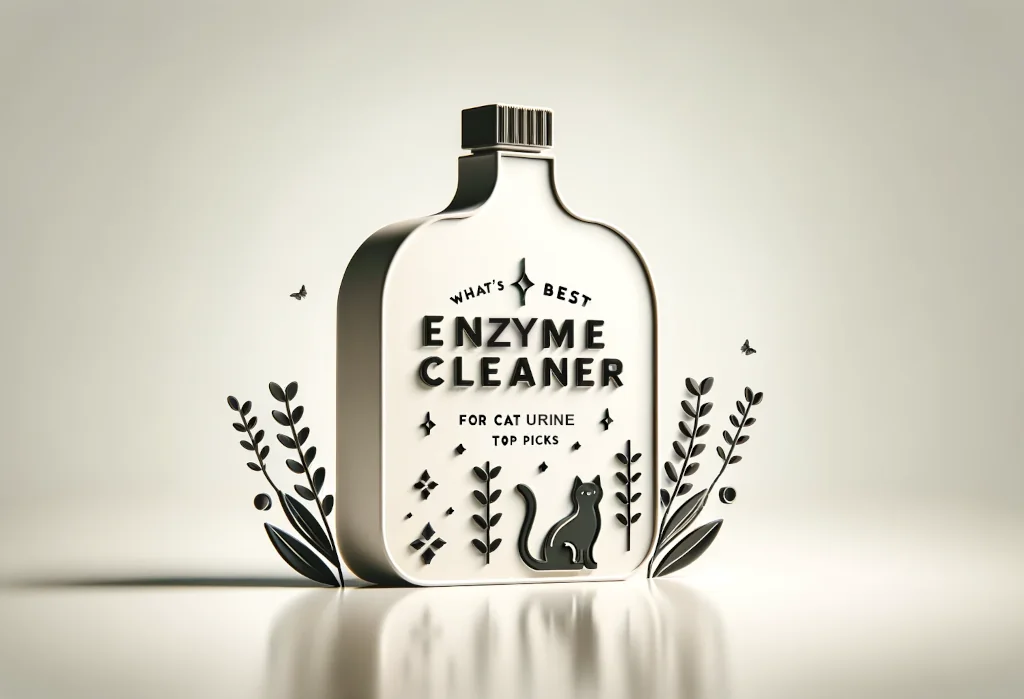Note: We may earn a commission from helpful, relevant links in our content. No cost to you. See our privacy policy.
Cat urine is no joke—it can make your home smell like a litter box convention in no time. And if you think masking it with a spring meadow-scented spray is the answer, well, you’re in for a pungent surprise. By the end of this blog post, you’ll be equipped with the know-how to choose the best enzyme cleaner to restore harmony and freshness to your feline-friendly home.
Key takeaways:
- Choose an enzyme cleaner with a specific enzyme blend like protease, amylase, and lipase for effective cat urine odor and stain removal.
- Opt for scent-free or lightly scented cleaners to avoid irritating pets or family members and truly eliminate odors, not just mask them.
- Verify that the cleaner is safe for use around pets and children, and can effectively tackle both fresh and set-in stains.
Why Are Enzyme Cleaners a Must for Cat Urine?
When it comes to tackling the unpleasant surprise of cat urine on your carpet or upholstery, enzyme cleaners are not just your best bet; they’re your knight in shining armor.
Unlike traditional cleaning products, which may play a game of hide and seek with odors (oftentimes just hiding them behind a floral facade), enzyme cleaners get down to the nitty-gritty, breaking down the urine’s components on a molecular level.
The science backing these cleaners is fascinating. Enzyme cleaners contain specific types of proteins — enzymes — that accelerate the breakdown of organic substances. Cat urine is rich in ammonia, uric acid, and bacteria, which contribute to the piercing and lingering odor that makes your nose wrinkle in displeasure. Now, enzymes such as urease jump into action, dismantling these compounds into simpler, odorless substances.
This targeted approach ensures that odors are not just masked, but are neutralized and permanently removed.
How Do Enzyme Cleaners Work Their Magic?
Let’s dive a bit deeper into the biological wizardry. When you douse the affected area with an enzyme cleaner, it’s like unleashing an army of microscopic Pac-Men, eager to gobble up the mess.
These enzymes latch onto molecules found in cat urine, such as proteins and fats, and digest them into water-soluble, easy-to-wipe-away bye-products. This process is akin to how your stomach breaks down food, but it’s happening right there on your living room rug.
It’s important to give the cleaner some time to work. We’re talking a bit of patience here — no need to watch the clock, but a few hours will do the trick. The cleaner remains active during this period, ensuring that even the most stubborn urine particles are waved goodbye, leaving your space as fresh as a daisy.
Are All Enzyme Cleaners Equally Effective?
Not all knights wear the same armor, and similarly, not all enzyme cleaners are created equal. The effectiveness of an enzyme cleaner hinges on its formulation. Some products may boast a broad-spectrum approach, containing a cocktail of enzymes set to tackle various organic stains and odors, while others might feature a more specialized blend targeted specifically at cat urine.
These specialized enzymes truly understand the ‘purr-ticular’ makeup of cat pee. For instance, enzymes like protease and amylase are dynamite against proteins and starches. Yet, a unique twist in your cleaner might be the inclusion of bacteria. Yeah, you heard that right — good bacteria. These helpful critters produce enzymes continually, leading to a product that keeps on working long after you’ve sprayed it. It’s like having a tiny bio-factory right there, dedicated to keeping your home fresh.
Choosing the right cleaner is essential. Always look for products with specific mentions of ‘pet’ or ‘cat urine,’ ensuring that the enzymes included are tailored for this task. Brands such as Nature’s Miracle and Rocco & Roxie offer enzyme cleaners beloved by cat owners. These products have amassed a loyal fanbase for their urine-busting prowess.
Remember, your best enzyme cleaner for cat urine may be hiding in plain sight, recommended by a fellow cat parent or vet, or it could be a gem you’ve stumbled upon through research and reviews. The proof, as they say, is in the pudding — or, in this case, the absence of that notorious cat urine odor.
Armed with a bit of know-how and the right enzyme cleaner, you’re now set to take on the daunting task of eradicating cat urine odors with confidence. And don’t forget, the best offense is a good defense; keep an eye on your feline friend’s litter box habits to catch issues before they become a smelly search-and-destroy mission on your carpets and furniture.
What Should You Look for in a Top-Quality Enzyme Cleaner?
When you’re on the hunt for the gold standard of enzyme cleaners to tackle cat urine, it’s like you’re a detective looking for clues. You want something that’s going to get the job done right—the first time. Here’s the lowdown on what makes an enzyme cleaner a real gem:
-
Type of Enzymes: Not all enzymes are created equal. Look for cleaners with a specific mix of enzymes such as protease or amylase that are known to break down the proteins and starches in cat urine. Some might even throw in lipase to handle any fatty components. A combo of these enzymes can pack a powerful punch.
-
Scent or Lack Thereof: It’s a real tightrope walk when it comes to scent. Some folks are after a fresh fragrance to mask the odor, while others are after a fragrance-free formula to prevent any irritation (for both humans and pets). Top-quality cleaners often offer both options—so take your pick based on what will tickle your nose the right way.
-
Additional Boosters: Sometimes it’s not just about the enzymes. Some cleaners bring in extra crew members like surfactants to break up the urine particles, making them easier for the enzymes to gobble up. Or how about the inclusion of subtle deterrents that discourage re-soiling? That’s a double duty cleaner right there.
-
Safety for Pets and Children: You want to be able to sleep at night knowing your cleaning products aren’t going to harm your furry friends or little ones. Look for non-toxic formulas that are safe to use around the whole family.
-
Speed of Action: The faster an enzyme cleaner works, the better. You’re after something that leaps into action as soon as you apply it, saving you time and hassle.
-
Ease of Use: Let’s face it, no one wants to struggle with a cleaner that requires a chemistry degree to use. Top-notch enzyme cleaners come in user-friendly sprays or other easy-to-apply forms.
-
Effectiveness in Old and New Stains: You’ve got to have confidence that your enzyme cleaner can handle both fresh and old, stubborn stains. The last thing you want is to apply a cleaner only to find it’s not up to snuff on a stain that’s been sitting a while.
Here’s a unique pointer you won’t find on every blog: Look for enzyme cleaners that specify action at a wider range of temperatures. Enzymes are sensitive little beasts, and if you find a cleaner that’s effective at both higher and lower temps, you’ve got more flexibility when it comes to cleaning in different seasons or climates.
Can Home Remedies Compete with Commercial Enzyme Cleaners?
Now, let’s chat about the David and Goliath of cleaning — that is, home remedies versus commercial enzyme cleaners. There’s a time and a place for each, and it’s worth weighing the options.
Pros of Home Remedies:
- Cost-Effective: Your wallet will breathe a sigh of relief. Often, home ingredients are cheaper than a bottle of commercial cleaner.
- Immediate Availability: You’ve likely got the ingredients to whip up a DIY concoction in your pantry right now. Immediate gratification, anyone?
- Natural: If you’re all about that green life, homemade solutions can give you peace of mind on the eco-friendliness front.
Cons of Home Remedies:
- Potency: The fact is, home remedies are often not as potent as their commercial counterparts. You might find yourself on your hands and knees scrubbing longer and harder.
- Inconsistency: A little of this, a splash of that — DIY mixtures can vary in their effectiveness due to lack of precision in measurement and ingredients.
- Risk of Damage: Homemade mixtures haven’t been lab-tested for colorfastness or material safety. That means a well-intentioned cleaning session could end with a ruined carpet.
Commercial cleaners, with their army of enzymes and rigorously tested formulas, are designed to work efficiently and reliably. They save time and usually come with a satisfaction guarantee. That’s not to say home remedies are out of the race — sometimes, a quick fix is all you need.
Here’s the killer tip: If you’re trying out a home remedy, do a spot test in an inconspicuous area first. It’s a step commonly skipped, but it can save you from turning a small mishap into a cleaning catastrophe.
So, there you have it—your very own treasure map to finding the best enzyme cleaner for cat urine. Whether you opt for a knight in shining armor off the shelf or prefer the underdog remedies from your own kitchen, the goal’s the same: to conquer that cat urine stain and smell once and for all. Choose wisely, and happy cleaning!
Alex, a passionate animal lover, has experience in training and understanding animal behavior. As a proud pet parent to two dogs and three cats, he founded AnimalReport.net to share insights from animal experts and expand his knowledge of the animal kingdom.










